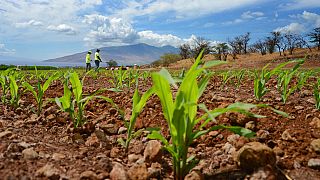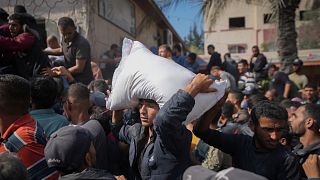Kenya
The worst drought in 40 years has hit farmers across east Africa, causing food insecurity and threatening famine.
In Kenya, arable land on the outskirts of the capital, Nairobi, is supposed to be especially fertile.
But four consecutive failed rainy seasons have turned one farmer's life upside down.
Alice Muthoni says it's been almost three years since she's had a substantial harvest.
"We used to sell a lot of maize after harvest. Now we didn't get enough for commercial use, just a bit for subsistence," she explains.
Muthoni says one acre delivers only about a bag of maize, "just enough for us to eat".
Kenya recently said it was lifting the decade-old ban on openly cultivating and importing genetically modified organisms (GMO).
It came amid pressure from the US government, which had argued that the ban affected US agricultural exports and food aid.
In the face of the ongoing drought crisis, the use of genetically modified crops is seen as a solution to failing harvests.
Roy Mugiira is the chief of Kenya's National Biosafety Authority (NBA).
He explains that the NBA has been testing one variety of maize that has been genetically modified (GM) to resist drought.
GM crops like this could result in a harvest "in times of high water stress when there is no rain," Mugiira believes.
But food security, consumer rights, and biodiversity groups have condemned the lifting of the ban.
They say there should have been public consultations on an issue that is vital to the country's economy and safety.
In a joint statement, they argued that the decision "essentially curtails the freedom of Kenyans to choose what they want to eat".
New President William Ruto took office last September promising a transparent government.
But opponents say his decision to openly cultivate and import genetically modified crops will hurt the growing organic export market.
It will also create unfair conditions for Kenyan farmers, 80% of whom are farming on a small scale.
At an organic farm next door to Muthoni's, farmer Esther Kagai says she has been able to make a healthy profit despite the drought.
Using low-tech irrigation techniques and indigenous seeds, her vegetables are flourishing.
Kagai says GM crops are not the solution to the food insecurity crisis, but making sure farmers have access to water is.
She also points out that controversies surround the use of GM crops, from their impact on human health to rising costs for farmers.
Mugiira, however, insists that consumers and farmers have no need to worry about GM seeds.
Tests were undertaken to prove that they are safe and the way forward, especially when facing the climate crisis, he says.











Go to video
84% of world's coral reefs affected by worst coral bleaching event in history
01:40
‘The Herds’ puppets highlight climate change in Lagos
Go to video
South African orphanage rehabilitates injured predator birds
01:37
Indigenous and climate activists rally in Brasília ahead of COP30
Go to video
Heavy rains flood Congo's capital, killing at least 22 people
01:54
Uganda: the infiltration of plastics into agricultural fields and food raise concern